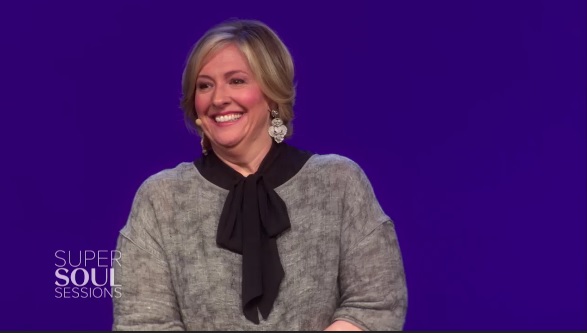
“What is trust? What do we talk about when we talk about trust? Trust is a big word, right? To hear, ‘I trust you’ or ‘I don’t trust you,’ I don’t even know what that means. So I wanted to know what is the anatomy of trust. What does that mean?” ~ Brene Brown
.
I was at my boyfriend’s house yesterday, and before I left to go home, he handed me a bag.
He was sending me home with two of my containers—returning them, as I’d sent him home with leftovers a few nights earlier.
But there was something else in the bag—a roll of paper towels.
“So you don’t have to stop on your way home,” he said.
He’d noticed I was out earlier that morning.
I almost burst into tears.
This is what I know to be love, at this age and stage.
“Can you believe that?” I asked my best friend. “Who does that? It’s so sweet. It’s so him, and it’s so nice.”
We didn’t need to detail past boyfriends, or what they didn’t do, or how they broke trust.
We didn’t have to relive the heartbreaks, the broken promises, the ones who didn’t keep their word or the ones who weren’t able to be considerate.
We just celebrated knowing how simple it can be—how conscious.
It was more than a moment of personal joy, though I realized only later.
It’s trust.
I get that now—now that I’ve just watched gifted storyteller and researcher, Brene Brown, who gave a talk entitled, “The Anatomy of Trust,” on Oprah’s Super Soul TV.
It’s online, it’s free, and and it takes half as long as a 50-minute therapy hour.
It’s going to improve my life, by improving all of my relationships.
With others—and with myself.
It’s as good as the “Ted Talk” she gave on vulnerability, which eventually went viral. It’s as intimate, illuminating and engaging.
For me, Brene Brown is always best when on a stage. She’s a natural and clear storyteller—a speaker who makes hard subjects (shame, vulnerability and trust) easy to understand. She mixes personal stories with researched data.
With story and explanation, she makes concepts that could be complicated—shame, vulnerability, trust—accessible, discussable and digestible.
Seriously, she has written a recipe for trust.
She offers us the ingredients that enable us to prepare, bake, make and feel quality trusting relationships.
With others.
With ourselves.
She’s not preaching or pushing her own agenda. She’s a warm Dr. Spock in a data download of sharing. She’s reiterating what she’s researched, studied and learned from her own parenting and from other researchers.
Trust isn’t only the absence of lies, deceit or betrayal—as I previously believed. Trust must be nurtured, built up and protected.
To cultivate trust, Brown says we need “Braving,” which consists of the following:
B = Boundaries
R = Reliability
A = Accountability
V = Vault
I = Integrity
N = Non Judgment
G = Generosity
I won’t elaborate on them all, as this is a must-see video, from start to finish—but I’ll give two examples.
V—“The Vault”—she says, “Shook me to the core.”
She said “the vault” doesn’t just mean, “What I share with you, you will hold in confidence. What you share with me, I will hold in confidence,” although those are crucial too. Rather, it also means seeing that one respects not only my story, but the story of others in one’s life as well.
I will notice how you treat others who trust you, and that will shape the trust between us. No one has put language to this before, or pointed out the way we lose respect for people who gossip with us. Wow.
Integrity, Brown says, has three pieces:
- Choosing courage over comfort.
- Choosing what’s right, over what’s fun, fast or easy.
- Practicing our values, not just professing our values.
We can improve trust now, with others, in all our crucial relationships. And not just with others, but with ourselves.
I’m so grateful Brene Brown’s words are in the world—and that there are words like bravery, courage, vulnerability and shame being discussed openly and often.
It’s important—but it’s also difficult.
If you’ve been a fixer, rescuer or helper of others (maybe even yourself)—she will challenge you.
I always thought I was pretty freaking nice. However, it turns out I’ve been something else–-judgmental.
It’s hard to see—until she says something like this:
“We think that we’ve set up trusting relationships with people who really trust us, because we’re always there to help them. But let me tell you this. If you can’t ask for help and they cannot reciprocate that—that is not a trusting relationship. Period. And when we assign value to needing help, when I think less of myself for needing help, whether you are conscious of it or not, when you offer help to someone you think less of them too. You cannot judge yourself for needing help but not judge others for needing your help. And somewhere in there, if you’re like me, you’re getting value from being the helper in a relationship, you think that’s your worth. But real trust doesn’t exist unless help is reciprocal in non judgment.”
F*ck! What?
Gulp—really?
That’s going to mean taking a different approach.
I’ve listened to this about 100 times, and I wish I learned this decades earlier.
I’ve been wrong about trust for a long time—about building it, with myself and with others.
I’ve been really wrong, really often, and not so gracefully.
I’ve tried to fix and rescue others.
I’ve devoted myself to fixing and rescuing myself, instead of just being there for myself.
I’ve judged—my own needs and neediness and thought I was pretty open with others.
Not possible—not really. Self-trust is vital too.
I’m pausing, stopping and replaying this—a lot.
Brene Brown explains trust as choices—a practice and the series of repeated actions—such as going to a funeral, even after a long-ass commute. Or picking up the phone when someone in crisis calls.
Trust isn’t only the absence of cruelty, but it’s the presence of connection.
She learned it from the work of John Gottman, PhD, who has been studying love and betrayal for decades (and wrote a book on it as well). Gottman explained: “To choose to not connect, when the opportunity is there, is a betrayal.”
With others—with ourselves.
Oh, wow.
Trust is not just about being present or giving to others either. It is about going to difficult events, taking the important phone calls and keeping our word. It’s all of that, but it’s also knowing ourselves well enough to set limits—not to over promise or break trust, by failing to keep our own word.
We have to be reliable—and yes, vulnerable. Trusting vulnerability.
We must be able to dare to utter the words, “I need help” as often as “What do you need?”
It’s not either/or—it’s both.
And, it’s also understanding the importance and significance of a roll of paper towel.
Yeah, that too.
.
Relephant:
Vulnerability: What’s Stopping Us.
.
Author: Christine “Cissy” White
Editor: Yoli Ramazzina
Photo: screenshot


Read 1 comment and reply